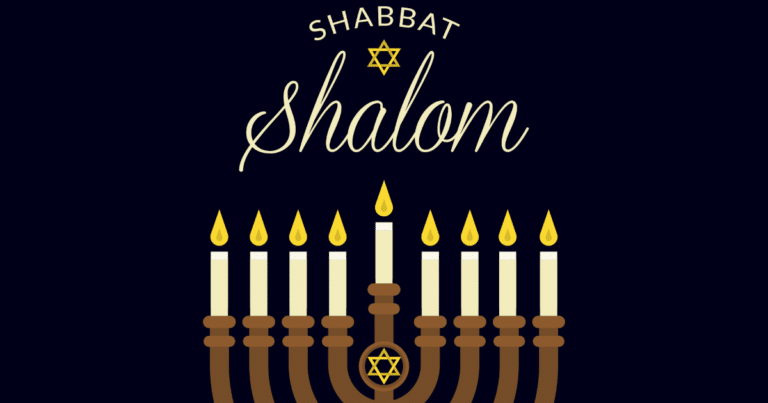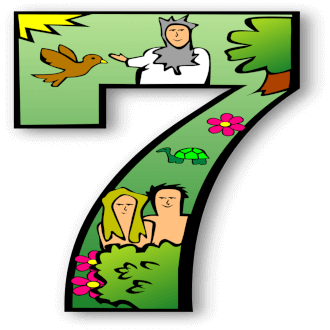By Lisa Cohen
Shabbat is one of the most important Jewish observances and is the 4th of the Ten Commandments.
Jews greet each other as the Sabbath is arriving each week with this phrase, “Shabbat Shalom”. The word “shalom” has many meanings in English, including, “hello”, “goodbye” and of course “peace”.
Shabbat is the Hebrew word for Saturday. So literally “Shabbat Shalom” is a wish for a “peaceful Shabbat”. It’s a very happy blessing to wish someone as everyone is thrilled when Shabbat – the day of rest – arrives.
When is Shabbat?
Shabbat starts from an hour before sundown on Friday evening and continues until sunset, with the appearance of three stars, on Saturday night – all in all, 25 hours. The beginning of Shabbat is marked by the lighting of two Shabbat candles with your eyes closed which involves blessings for the Shabbat. The moment you open your eyes and see the two flames of holiness a feeling of peacefulness fills the home.
Shabbat is an official day of rest coming from the Bible: Genesis2:2-3 which states “And on the seventh day God ended His work which He had done, and He rested on the seventh day from all His work which He had done. Then God blessed the seventh day and sanctified it, because in it He rested from all His work which God had created and made.”
Shabbat led to the 5 Day Week
The seventh day of rest is celebrated by Christians on Sunday. In 19th century Britain, Sundays became an official day of rest with no work allowed.
This did not take into account the Jewish workers, but they were finally recognized in an American mill in 1908 where the milliner decided to give his workers both Saturday and Sunday, so that whatever their religion, they could take their appropriate day of rest. In 1932, the USA officially adopted a 5 day week.
But What Do you Do on a Day of Rest?
Well that’s the point – we stop DOING!
Just like God stopped “making” on the 7th day, we too change from “doing” to “being“. This is one of the most conscious concepts that is currently being encouraged and adopted by meditators, new-age thinkers. medical experts, philosophers, business leaders as well as religious leaders. When we are in a mode of being we are able to connect to ourselves, to others and to spirituality.
One of the main connections made on Shabbat is between family members, as for one whole day the family spends time with them as no technology, travel, housework or work is permitted. Consequently, a whole day is spent together as a family – reading, chatting, playing , visiting friends and connecting spiritually through prayer, expressing gratefulness. This all sounds like a very 2021 self help book, despite it’s beginning being 3500 years old!
What Does a Traditional Jewish Family Do on Shabbat?
Friday Night
On Friday night, after candle lighting, there are prayer services in the synagogue with much singing blessing God and His creations, followed by a family meal filled with delicious traditional Jewish foods. The meal is opened with blessings over wine called “Kiddush“, followed by blessings over two loaves of special plaited bread called “hallah“.
The meal is accompanied by singing of psalms, the re-telling of bible stories, general family chat and sharing of news. At the end of the meal, the family say a prayer of thanks to God for providing the sustenance. Shabbat dinner, on Friday night, is an opportunity of real connection physically and spiritually. Whilst most Americans may do this annually on Thanks Giving, the Jewish people do this every Friday night.
Shabbat Day
On Shabbat morning there is another prayer service in the synagogue, where the weekly portion of the Torah is read. This is often followed by a “Kiddush” which is where communities take the opportunity to join together to bless the wine, snack and chat – another opportunity of connection, this time as a community. Then, each family goes home for another family meal, hosts friends or welcomes someone alone to their home.
After another delicious meal, the family takes time devoted to real rest. To rest can be a variety of activities such as sleeping, reading, going for a stroll with someone or playing.
The Benefits of Shabbat
As you can see, such a day of rest honored by Judaism, nourishes every part of us – body, mind and soul. It has been proven scientifically that people can not keep running on and on with no break from such hectic lives, from technology addiction to work addiction.
A day of rest has been proven to be the only way to have a healthy, balanced life. There is a human need to recharge our batteries before they run out of energy and we collapse. God gave us the answer 3500 years ago when He took a day of rest after completing Creation. He commanded us to do likewise.
What do our Rabbis teach us about Shabbat?
As Rabbi Hirsch says in “Eco Bible”: Eco Bible, Volume 1: An Ecological Commentary on Genesis and Exodus, Shabbat was given to humanity “in order that one should not grow overbearing in his dominion” of God’s creation. On the Day of Rest, “he must, as it were, return the borrowed world to its Divine Owner in order to realize that it is but lent to him.” Ingrained in the process of creation is a weekly reminder.
We Need Shabbat in Order to Save Both Ourselves and God’s Earth!
Observance of Shabbat – taking a day each week to refrain from the transformation of nature – has the potential to alter a person’s feeling of creative and technological control over nature. In early nineteenth-century Germany, Rabbi Samson Raphael Hirsch senses the profound relevance of Shabbat for industrial society, exclaiming, “Sabbath in our time! To cease for a whole day from all business, from all work, in the frenzied hurry-scurry of our time! . . . The pulse of life would stop beating and the world perish! The world perish? On the contrary, it would be saved.”
This message of Shabbat is sorely needed in today’s Western society. The mentality and lifestyle of transforming the natural world, without taking time to reflect on the value of that transformation, is taking an environmental toll on the planet.
A society that never rests nor reflects is the same society that over-extracts and over-consumes. This mastery of the earth without sufficient contemplation of its consequences has produced ecological destruction on the local, regional, and global level.
On Shabbat, we are to walk on the earth without asserting our mastery over it, in order to acknowledge the sovereignty of the Creator. In this way, we will remember that we are only the custodians of the earth with the responsibility “to work it and to guard it.” Rabbi Norman Lamm, “Ecology in Jewish Law and Theology“.
Greeting for the End of Shabbat
As Shabbat ends there is a unique ceremony that blesses the division between the holiness of the Shabbat day from the normal routine of the rest of the week. Without a busy, hectic routine of “doing” we could not appreciate the greatness of time for “being”, so this differentiation shows our gratefulness. The Havdalah blessings on wine, a plaited candle and the smell of spices marks this differentiation.
Finally, with recharged batteries, a rested body and soul we wish each other greetings of – “Shavua Tov”. “Shavua” is the Hebrew word for “week” and “tov” is the Hebrew word for “good”. So, having been replenished spiritually and physically by a Shabbat Shalom, a peaceful Shabbat, a day of rest, we wish each other to have a good week – Shavua Tov!
* Featured image source









Ďakujem za vysvetlenie.
Thankyou very much for everything explained about SHABBAT SHALOM.Really I learnt much..
Thank you for a wonderful explanation! 🙂
I am a Christian Pastor and obviously a believer and follower of Yeshua HaMaschiach, The Anointed One. Thanks for your in-depth article, I even shared it with one of my mentees who is interested in learning about religions. I’m not a follower of religion, but I’m interested in a Relationship with the Jesus of the Bible, in whom all things were created! See Colossians1:15-20. Shalom Aleichem!
I’m interested in following this church can I know more about it and do u guys have locations in amarillo Tx
What a fabulous resource. Thank you. Years ago whilin college, I attended a Catholic Student community named the Shalom House where worship, praise for God and community for students was paramount.
How nice it is to discover your website. Thank you.
Thank you for your kind words, Susan.
Thank you for explaining to me the meaning of Shabbat Shalom. I have always wanted to know what day it was that God rested on. I now know it was Saturday that was on the seventh day that God rested on and I will do my very best to do the same. Can you please let me know if Praying the Rosary as I do is a good thing to do. I was told by Father Cisco of the Catholic Church that when God calls for us meaning when we pass away that there are 3 places our souls go to either Heaven,Purgatory or Hell. Can you please explain to me if this is so. I am also told that Praying the Rosary can help to the release of someone in Purgatory to go to Heaven, is this true? Some of my friends/Family member tell me being a Catholic/Christian that there is no Purgatory and I don’t understand why they would say that.
Thank you,
Shabbat Shalom to you and God Bless you and your loved one’s
Sincerely,
Louis Campos/USA
In response to your questions: I am not a cleric but I was raised Catholic but left that faith when I noticed there were no Bibles in church, the homily was in the missal and was the same in every RC church. I found that was comforting at the time knowing the faith was constant. However; we were encouraged to go to catechism, pray the Rosary to focus on the life of Jesus but not so much the Resurrection which was the point. I began to see my cross as empty because of this. Not the Crucifix with the dying Christ. We were never encouraged to read the Bible for ourselves but go to priests for counseling. I read the Words of God in His word and never found the practice of praying people out of purgatory. No mention of a holding area. Jesus explained it differently as did the Apostles. So I think if the Rosary gives you comfort and focus then do so but also read The Word whether it is The Torah for Jewish brothers and sisters or the Bible for Christians. The practice of Shabbat Shalom is wonderful and the basis is beautiful.
Every Catholic church I have ever been in has a missal which is the readings from the bible covering half the year then they are changed out halfway through the year. I have never heard of or seen a homily pre-printed before mass. Unfortunately, it sounds like the specific church or priests therein are below par in many respects. Don’t throw out the faith because of this.
I agree 100 percent I’m raise Catholic and that’s all I know and I’m trying to find a church that fits me and my children and one day I was talking to God in prayer at subway 13 years ago and I started speaking another language but I only remember saying shallom the whole sentence it made sense at one point and my mentality got like erased I don’t remember what I was saying
Sounds like you got hit with the holy spirit. Pentecostal 100%
shabbat shalom
I love Shabbat! Thank You for this article and may God bless Jerusalem with peace! 🎶 💕 🕯🕊 🌅
Great learning lesson..
Meu nome e: Teresinha, obrigada por esta reportagem
Gostei muito de aprender sobre a cultura Judaica, que gosto muito.
Shalom!